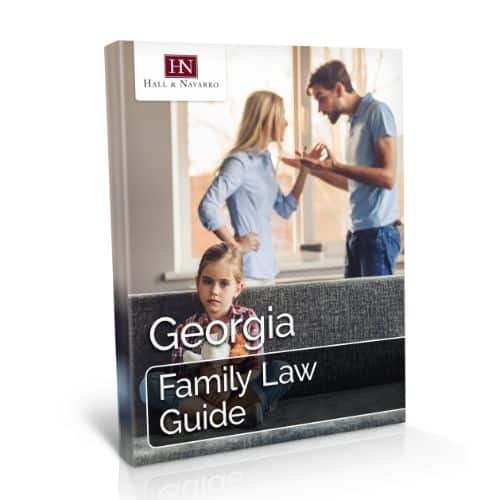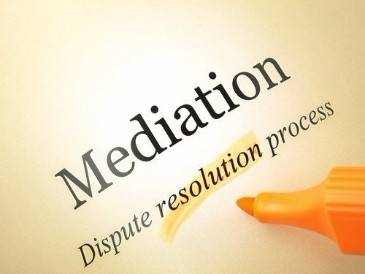 Georgia Family Law Guide
Georgia Family Law Guide
The Georgia Family Law Guide was created by Hall & Navarro to help residents obtain maximum compensation for their claim.
Handling Divorce Matters
Our Georgia family law attorneys understand how difficult divorce can be for parties involved. We want to make your divorce easier, smoother and quicker, if possible. There are two types of divorce: one is contested and one is non-contested. Ideally, you would go through a non-contested divorce where you and your soon to be ex-spouse agree on most things and can use a mediator. Non-contested divorces do not need a judge to deliberate about what happens in the divorce.
Contested divorces are as it sounds— much more difficult. They often involve more tension and stress between the two divorcing parties. Unfortunately, it’s going to be more difficult this way. The best thing that you can do is have a fierce lawyer on your side to get you through this and achieve a fair result.
Regardless if your divorce is going to go smoothly over a couple of weeks or be an arduous process over several months, we want to stand by you. This is a difficult time for people, and our Georgia family law attorneys respect that.
Handling Alimony Matters
Alimony won’t be involved with every single divorce, but our Georgia family law attorneys are apt in handling divorces that do require some form of spousal support. Again, not every divorce is going to have alimony involved because not every divorce needs it.
Alimony is typically given to the party in the divorce who requires financial support in order to maintain the lifestyle which they’ve been accustomed to, so long as it is reasonable. If one spouse is working and the other is not, alimony may be given either temporarily or permanently, so that the spouse can provide for themselves.
If a spouse needs to return to school in order to become gainfully employed, then alimony might be given temporarily in order to help them on the journey.
Every single case is going to be completely unique, and you absolutely need to speak to our Georgia family law attorneys if alimony is something that you want, are concerned about or both. We are here to help guide you either way.
Please understand that alimony can be requested at any time during the divorce process by either party but only granted to one.
Handling Child Custody Matters
Child custody matters can be very stressful for everyone involved. Our Georgia family law attorneys want to be sure that you are represented well when custody is being deliberated. While we will be there for you to help make sure that the end result reflects what we believe to be fair for you, at the end of the day custody is going to be based on what is best for the children.
There are several different outcomes to custody agreements. There might be one person who has sole custody of the children, the parties may have joint physical custody and the children will spend even time with them, or one parent might have physical custody while both parents have legal custody. Legal custody means that you can help make decisions about education, medical decisions, and extracurricular activities.
Again, the judge is going to work in the best interest of the children. You might be worried if they’re going to favor one party over the other. It does not work like that. Factors such as what housing each party has, the finances of each party, their relationship to the child, and more go into determining how custody is going to be granted.
Handling Child Support Matters
Child support is a very complicated matter in family law. It is enforced through the law, which means you cannot be late for payments or skip payments. You can get into serious legal trouble if that happens. Every case of child support is going to be different. To ensure that the results are fair, you need to work with our Georgia family law attorneys. An agreement will be met based on custody, finances, and more. We want to ensure that it is both fair to your children and to yourself.
 Divorce Mediation Cost in Georgia
Divorce Mediation Cost in Georgia
Oftentimes, we ask our clients to attend a mediation and their first question is whether that is going to save them money in their divorce case. In Georgia, I would say, yes, absolutely. Attending a mediation, if it is successful, will save you money because, especially in our local court system, there is a lot of backlog. You could wait three to six months to have a trial date scheduled, whereas we usually could get a mediation day within about 30 days from the day that we request it. You can work mediation around your own schedule. You are not at the whim of the court system and their time constraints. Oftentimes, when we attend mediation and it ends successfully, even if that takes six to eight hours of your time, it is going to be a lot cheaper than going forward with the trail process and having the attorney fees built up over the course of several months. After a mediation is successfully completed, you can alert the trial court that you’ve reached an agreement in your divorce case, and in Georgia, you are allowed to proceed with gathering the final divorce decree so that your case has been ended, you’re officially divorced, and you don’t have to wait that extra time and spend that extra money. I would say that mediation is a very cost efficient and effective way to push forward your case in the most expedited process, but also to save a little bit of money. If you have any questions about the mediation process during your divorce case or whether your case may be eligible for mediation to save you a little bit of money, just call our office and we’ll be more than happy to look at the facts and circumstance of your case and see if that would be appropriate.
Sharing a Home During Divorce in Georgia
I had a client call me with what is not a unique situation and asked me if both he and his wife could share the marital residence during their pending divorce in Georgia. In fact, you can, and it is more and more common just from an economic standpoint that folks going through a divorce remain under the same roof until everything is finalized. The key to the situation is you cannot act as husband and wife while you’re living in the home together, specifically you cannot consummate the marriage. If you do that and your divorce complaint has been filed, it is subject to being dismissed. You can live under the same roof, but you cannot cohabitate, and you cannot hold yourself out as husband and wife. If you have question about this or anything else related to your divorce, I’d love to help you with it. Please don’t hesitate to call me.
Going to Court for Divorce in Georgia
I was speaking with a client the other day about whether they would have to actually go to court once we’ve filed their divorce case. In Georgia, our circuit does require that you should go in front of a judge and present your evidence, and if it’s even uncontested, at least one party would have to be in court. Now, if it’s a contested divorce, you can expect for you and your spouse to appear in court probably multiple times. Within the first couple of weeks of filing your divorce case, in Georgia, you can go and ask the court for temporary relieve. Of course, you would want to go to court on that day to tell the judge what you need and what your children need and some of the things that you want for that temporary period of time. While you are waiting for the discovery process, which usually lasts around six months, you’re going to want a court order that tells you how to proceed with your children and your finances. You would want to go to court that first time. You would need to be represented by our office. If we were involved in your case, we would go with you. Then at the end of your case, you also would need to go back to court, either to present your final evidence on your divorce case or to submit any kind of settlement that you’ve reached with your spouse. At minimum, you should expect with our office that you would be present in court twice during the terms of your case. Of course, if there are issues that may arise, you may have multiple hearings. The court would want to see you in person to address any of those issues that come up during your divorce case. If you have any questions or hesitancies about whether you would want to be in court or how to dress or what you should do or say when you’re actually in court in front of a judge, just give us a call. We can look at your facts and tell you whether it would be appropriate to approach a judge sooner rather than later and we can certainly walk with you through that process and make sure that you’re completely comfortable by the time we get to court.
 Alleviating Divorce Expenses in Georgia
Alleviating Divorce Expenses in Georgia
I got a call from a client the other day where it was an initial consultation and their biggest concern was the financial aspects of actually filing divorce in Georgia. The important thing, if you wanted to alleviate some divorce expenses, would be to gather a lot of your documents ahead of time and bring these with you to your initial consultation. That can be your pay stubs, your tax returns, bank statements, and anything that would show us the names that your property is in or any rental property you may own. Those documents can really help us save some time at the beginning of your litigation by not having to go through the long discovery process of requesting your bank statements directly from your bank. That can take anywhere from 30 to 60 days to get those documents. The same with your employer, takes them a little bit longer to gather things that maybe you already have in your possession. To save some expenses, my suggestion would always be to gather your documents, bring them to us. Let us determine if there are other things that you may be missing out of that list and if you can help get us the things that we need documentation wise, that would certainly save on discovery expenses and time of our office having to chase things that you could easily have access to. With that being said, it’s never a problem for us to get those documents so we certainly can do that, have the ability to do that, but if your concern is saving on some expenses during your divorce process, that would be my suggestion. If you need any help with what items you may want to bring with you in your consultation, just call us ahead of time. We’ll be happy to supply an email list of things that may be wise for you to bring with you to your first appointment.
Choosing a Divorce Attorney in Georgia
Oftentimes, I’m approached by family and friends asking, if they wanted to file a divorce, how they should choose an attorney. Oftentimes, I tell them, first, you have to have a very good connection with that person. You would need to either meet them in person or have a video chat with them to make sure that there is a connection and a trust there. The second thing I would do is look up the attorney on Google and see what kind of reviews they get and what kind of past experiences other clients may have had. A lot of times people don’t want to ask their friends and family about who they used for their divorce but that’s really the best opinion that you’re going to get is someone who’s actually been through the divorce process in Georgia and has used an attorney. How they had that experience and whether the attorney was a good fit or not from person to person can vary. My suggestion would be to make an appointment, either in person or video chat, whether that’s me or Martha at our office. We can meet with you for that first hour to make sure that you have a good connection and that we can build trust between the two of us and the client and that’s always the number one thing that you should look for when you’re hiring a divorce attorney in Georgia.
Divorcing Someone Who Doesn’t Live in Georgia
I had a client call this week about getting a divorce, but his spouse lived in another state and had in fact left the state of Georgia some months before he called me. Because of that reason, he was going to have to file for divorce in the state where his spouse lives. When you sue someone for divorce, you have to sue them where they live as long as you have a specific address in order to serve them. I would not be able to help him with the divorce. He would have to hire an attorney in the state that his spouse moved to. If you have a situation like this or any other situation related to a divorce, I’d love to help you. Please don’t hesitate to call me.
 How Divorce Mediation Works in Georgia
How Divorce Mediation Works in Georgia
In Georgia, a lot of folks have heard of the term mediation. When you file a divorce, a lot of clients ask during the initial consultation if mediation is right for them. Almost always in our office, we would say the answer would be, yes, that mediation can be very helpful to you and your case. Really, a mediation is where a neutral party goes between the two divorced parties and they would see what kind of resolution you may reach in your case.
Now, from the beginning, it may seem that a resolution is not going to happen for you, but what I would encourage you to do is to try it out, because you may reach an agreement on things that you had no idea that would be possible. We have very good mediators in our circuit and our judges really encourage everyone to attend mediation and really put their best foot forward to try and reach a resolution where there can be one. Especially when it comes to custody issues, it’s very wise for parents to sit down and see what kind of agreement they can reach on parenting time. You may not reach an agreement as to physical custody, but you may reach an agreement on special things that you’re going to do on the 4th of July or Christmas or other special traditions that you and your spouse have with your kids. A judge isn’t going to take the time to really consider those things in any kind of trial. It would be best in a mediation to take the chance, with your attorney in the room and with the mediator going back and forth between the parties, to really try and reach a resolution that fits your kids and your situation. That really would be beneficial to you in any future trial that you may have to show the judge that you put forth a good effort to try and reach an agreement with the parties. Oftentimes, we find that the people who didn’t think they would reach a resolution actually are the folks that will at the end say they’re so glad that they did that. They reached a settlement. The trial was not necessary. It expedited their divorce process. They were extremely happy with the results after attending mediation in their divorce case. If you have any questions about how mediation can help you or whether it would be appropriate for you and your spouse to go do mediation even before filing for divorce, please give our office a call. We’ll help walk you through the steps of how you can achieve a successful mediation.
Inheritance in the Divorce Process in Georgia
I have several clients who have called me about their inheritance. They are in the middle of a divorce and they want to know how the inheritance would be treated in the divorce. Inheritance in Georgia is considered separate property, meaning it’s not subject to division in a divorce. It is not marital property. It is separate property, so long as the inheritance is kept separate, and what I mean by that is kept solely in the other spouse’s name. If it’s land, the deed remains solely in the person who inherited the property solely in their name. It can be a little complicated because sometimes things get comingled, but if you have this situation in your divorce or really any other question about a divorce, I’d love to help you with that. Please don’t hesitate to call us.
I have several clients who have called me about their inheritance. They are in the middle of a divorce and they want to know how the inheritance would be treated in the divorce. Inheritance in Georgia is considered separate property, meaning it’s not subject to division in a divorce. It is not marital property. It is separate property, so long as the inheritance is kept separate, and what I mean by that is kept solely in the other spouse’s name. If it’s land, the deed remains solely in the person who inherited the property solely in their name. It can be a little complicated because sometimes things get comingled, but if you have this situation in your divorce or really any other question about a divorce, I’d love to help you with that. Please don’t hesitate to call us.
 Uncontested Divorce Timeline in Georgia
Uncontested Divorce Timeline in Georgia
I have several clients who call because they and the opposing party have worked out everything and basically have an uncontested divorce. An uncontested divorce is when the parties have a full agreement on all the issues related to assets, debts, children, spousal support. They’ve worked it out and have drawn it up on a piece of paper and they just need the attorney to help put everything in the proper form. You can be divorced within 45 days or so if in fact you have an agreement on all of these issues. If you believe that you have an uncontested agreement, I’d love to talk with you about that, explain the ins and outs and the proper paperwork. Please do not hesitate to call me.
Divorce Process Timeline in Georgia
I had a client call the other day wanting to know specifically how long it takes to get divorced in Georgia. Georgia only has a 31-day waiting period. It’s one of the shortest waiting periods basically in the United States. Most states have either six months or a year that you have to wait to get divorced. In Georgia, it’s only 31 days from the date the complaint is filed and served. If you have everything agreed upon, all of your assets distributed, your separation agreement done, any custody arrangement mapped out and a parenting plan, if all of that is done, 31 days after the filing of the complaint, you can be divorced in Georgia. I’d love to talk with you about your situation if you’re facing a divorce here, we’d be more than happy to help you get your case resolved.
The Grounds for Divorce in Georgia
The other day I had a call from a client who was in the middle of a divorce and he was asking me what the grounds for divorce in Georgia are. There are basically 13 grounds for divorce. They range from adultery, habitual intoxication, abuse, fraud. The most common ground for divorce in Georgia is irreconcilable differences, which simply means that people are not getting along. Most folks end up filing the divorce on those particular grounds. If you are considering divorce or in the middle of divorce, been served divorce papers, I would love to talk with you about your individual case. I’d love to help you get your case resolved. Please call me.
Equitable Distribution in Georgia
Oftentimes, during a divorce case, our clients will ask us about dividing up their property. In Georgia, for divorce cases, it’s an equitable division of all of your assets and all of your debts. Equitable does not mean equal. It just means fair. The court is going to look at your facts and circumstances to see what a fair distribution of your assets and debts would be. Oftentimes, that could mean a 50-50 equal split of all of your assets and all of your debts. If your facts and circumstances, however, are in a way that it may be more fair for one spouse to have 60% or 70% of the assets or 60% or 70% of the debts based on maybe their incomes, the court is going to look at those facts and circumstances to make sure that the split on both your assets and your debts are going to be fair. Any time you want to reach a settlement in your case, you can always look at either an equal distribution, if that’s what you believe is fair, or an unequal distribution. So long as we can certify to the court that the distribution that we’ve settled on is actually fair and the court will sign off as that being an equitable distribution of your assets and your debts. If you have any questions about how your assets and debts may be divided under this equitable distribution in Georgia, please give our office a call. We can walk you through all of your assets and debts to see what would be appropriate in your case.
 Division of Assets Process in Georgia
Division of Assets Process in Georgia
Oftentimes, we get calls from our current clients wondering how the court goes about distributing their assets and what happens to their assets and all of their debts. In Georgia, in divorce cases, they’re an equitable distribution of property and debts. What happens is the court will want us to itemize all of your assets and all of your debts, track them back to where they came from and who paid for them or how they were transferred into your name. So long as it is marital property and up for distribution, the court is going to walk through the value, any mortgages or debts owed on any pieces of property or vehicles. We’re going to look at the equity and decide equitably and fairly what should the split be on both your assets and your debts. Oftentimes, we’re able to put together an exhibit or basically a chart for the court so that it’s easily looked at to see how much equity you’re dealing with in your assets and we always propose to the judge what we think would be a fair split of those assets. We would, of course, work with our clients to decide what they believe is fair and walk through every asset and every debt individually so that we give the court a full picture of what’s really going on in their financial circumstances. If you have any questions about a specific asset or debt or how that would be divided in a court trial process or what would happen to those assets after a divorce was completed, please give us a call. We’d be more than happy to talk to you about your facts.
Family House During a Divorce in Georgia
Whenever we receive a call from a new client, one of their major concerns is that they have a residence and they want to know what’s going to happen to that house after a divorce is completed. It’s a bit of a complicated answer because some people want to remain in their residence and some people don’t. Some people want to get a fresh start.
The first question that we would ask usually during your initial consultation is what you want to happen to that home. Depending on what your answer is, whether you want to stay in the house or whether you want to move somewhere else, we really need to sit down and look at whether you can afford to stay there, whether it would require your spouse’s support to stay there, whether your children are comfortable and want to stay there or not.
Certainly, the location of where you’re going to live is going to matter to the court as to custody. The question that we usually get when it comes to your home is whether your kids are comfortable there. Do they want to stay? Is it in their school district? If you can afford to stay there, that would be our proposal to the judge. Now, if you can’t afford to stay there, that creates an issue for the trial court to decide, how can we pay for this home if you want to stay? Would it be more appropriate for both parties if it’s listed for sale? If that’s the case, should we sell it while we’re in divorce? Should we wait until after the divorce is complete and then put it on the market and then transfer the children out of the home? The judge is really going to want us to walk him through what you want to happen, how it’s going to affect your kids, if you have any, and who’s going to maintain the debt on that property. Based on that and our answers in the trail court, that judge is going to decide whether you’re going to be able to keep your home, maintain the payments on it, or whether it may be best to sell the property and split the proceeds. A lot of times, so long as we tell the court and show the court that it’s reasonable for you to remain in your home, the court is not going to force you out of your residence. Now, if you have any questions about your particular facts and circumstances and whether you can keep your home or how to go about selling your home during your divorce case, please give our office a call. We’ll be more than happy to help.
First Step in the Divorce Process in Georgia
I had a friend of mine call me who was considering a divorce and wanted to know what the first steps were that she needed to take when considering divorce in Georgia. The very first step that you need to take is to contact an attorney to help guide you through the process. Step one would be that consultation with the attorney where you get basically an hour’s worth of advice about what to do with regards to your assets, your debts, and whether or not you’d be eligible for spousal support. If there are children involved, what would your parenting plan look like? What would your custody time look like? How much child support might you receive? You can get all of that information in a consultation with me. The first step after that consultation would be the filing of your complaint for divorce. Every case is different and specific. We provide unique advice for your particular situation. Please call us. We’d love to help you.
 What to Bring to a Divorce Consultation in Georgia
What to Bring to a Divorce Consultation in Georgia
Clients often call about what to bring to the first consultation for divorce when they come and meet me for the first time. The documents that you need to bring to the consultation are mainly financial documents, tax returns, a month worth of bank records, a listing of your major assets. Not every single piece of furniture but the major assets between you and your spouse and then some idea about what you might have in mind, if you have children, what a parenting plan or a custody arrangement might look like. Basic financial information, like paycheck stubs and tax returns, and then we can work through anything else that I would need after that initial consultation. If you are in the middle of a divorce or considering a divorce, I would love to help you with that. Please don’t hesitate to call us.
Personal Belongings During the Divorce Process in Georgia
I got a call the other day from a client who had some personal belongings they had questions about in their divorce case. In Georgia, your personal property, including pictures, clothes, any items in your home, may still be considered marital property. It’s very important that you take your time to itemize all of your personal belongings, tell us where they came from, track who bought those items, whether they were gifts, and whether you purchased those prior to your marriage. All of those things are important to know as we’re figuring out what should happen with those personal belongings. Ultimately, the court is going to take your list of personal belongings and your spouse’s list of personal belongings and look to see which ones are easy fixes. You keep your clothes. Your spouse keeps their clothes. Those are the easy ones. The not so easy ones may be if you have boats, motors, trailers, jet skis— all of the things that you still want to maintain but that are just items of personal property that you may have received during your marriage.
The court is then going to look at what equity you have in those pieces of personal property. Do you have jet skis that are paid for? Those may be of value to the marital estate and the judge is going to divide those equitably, so whatever is fair, divide those between the parties at any final trial. You can also reach an agreement to split certain pieces of personal property and our courts really do encourage you to do that. In Georgia, if you have an agreement as to who keeps the jet ski and who keeps the RV, well, the court is going to sign off on that so long as it seems to be fair. We would ask that we narrow down during your case, narrow down your personal items to what you may be okay with the other party keeping or what you want to keep in your possession and to the extent you’ve reached an agreement, the trail court is going to sign off on that. If you’re not able to reach an agreement on certain items of property, the court considers that like any other asset and is going to divide that fairly and equitably under Georgia law. If you have any questions about particular items of personal property that we’ve mentioned here or some others that maybe were not mentioned, give our office a call. Make an appointment. We can walk through those items of personal property with you to see how they may be divided in any divorce trial.
Summer Home During a Divorce in Georgia
I had a client call the other day because he is in the middle of a divorce and wanted to know what would happen with his vacation home as a result of going through this divorce. How would it be divided up? The summer home would be an asset of the marriage, if it was purchased during the marriage. It would be assessed to establish a value and the client would be required to buy out the other spouse or pay them the equity and the property. If you don’t reach an agreement and you ask a judge, a judge could order that the vacation home be sold. That is why we generally are advocates of mediation so that the parties can work together to come to a resolution where the assets basically aren’t sold at the direction of a judge who really doesn’t know that much about your personal property. If you’re in the middle of a divorce and you have assets, real estate, and have questions about that, I’d love to help you with that and I would love to talk with you about the possibility of mediation. Please call us.
 Owning a Business with Your Ex Before a Divorce in Georgia
Owning a Business with Your Ex Before a Divorce in Georgia
I represent several people who are business owners who are going through a divorce and their first question to me is usually what will happen to their business as a result of a divorce. Am I going to have to remain business partners with my soon to be ex-spouse? What exactly is going to happen to my business? This is a huge concern and what the courts do in Georgia with business is a variety of different things that they do. One, one spouse can buy out the other spouse out of the business so that they are not business partners anymore. The court can value the business and simply market it and sell it. Ideally, what you would want to do if you’re a business owner going through a divorce, you would want to talk with your spouse. Do your very best to reach an agreement as to how that business is either distributed or dissolved or maintained where your spouse agrees to a certain number, a certain amount to be bought out so that the business can continue. You rarely want to leave it up to a judge to direct you as to what’s going to happen to your business that you worked at years and years and years. Ideally, it’s better, if you can, to reach an agreement. This is a very complicated question. If you have a question about being a business owner going through a divorce or any question about divorce, please contact us. We’d love to help you.
Payment for Legal Fees During a Divorce in Georgia
I had a client call recently about whether or not her soon to be ex-husband was going to be required to pay the legal fees for the cost of the divorce in Georgia. There is no mandatory requirement in our state to have the opposing party pay the legal fees. That is 100% at the discretion of the court. When I file for divorce, I always ask that my client be reimbursed for the legal fees that he or she incurs in pursuing the divorce, but ultimately, that is up to a superior court judge. If you have questions about your divorce, whether it’s attorney fees or anything else, I would love to help you resolve your case. Please don’t hesitate to call me.
Determining Alimony in Georgia
I attended a mediation last month with a client who was eligible for alimony and the parties had determined that that was something that she needed in order to remain financially stable following the divorce. The biggest question was to determine the amount of alimony that is needed and how a trial court would calculate that amount. Unfortunately, under Georgia law, we don’t have an established formula for calculating and setting alimony in divorce cases. The judge is going to look at one party’s need and the other party’s ability to pay and that can range dramatically even throughout the life of a divorce case. Parties may be employed or may have changes of income while a divorce is pending, so it’s imperative that we show the judge one party’s need and the other party’s ability to pay over a certain period of time. Ultimately, we look at the last three years of one party’s budget, being their need of financial support, and the other party’s three years of income, or their ability to pay. We also would consider factors, such as if one party’s going to retire soon and what kind of retirement income they may have, or is one party’s job unstable where they may not make that much from year to year. All these factors we would want to consider and present to the judge so that ultimately the judge can make a deciding factor on what the formula is, how much alimony would be, and what would be appropriate in your circumstances. Unfortunately, it’s a moving target throughout the divorce case. If you have questions about this and would like to speak with us about what kind of alimony you may be eligible for or what factors in your case the judge is really going to focus in on, give us a call so that we can hear about your case and your facts and really talk with you about your situation and determine what you need to be asking the trial court for.
 Length of Alimony in Georgia
Length of Alimony in Georgia
I was meeting with a client last month and he was willing to pay alimony to his spouse. However, the question was how long should he be obligated to do it? In Georgia, there’s no set formula for how long alimony lasts or how much alimony can be for every month or every year, so long as alimony exists. It oftentimes, based on your circumstances and your facts, will be determined that alimony should last for X number of years. Ultimately, if you’ve not been married for ten years or longer, alimony may not be on the table for you. If you have been married for longer than ten years, especially if you get up to 20, 25, 30 years of marriage, then the court is going to look at an alimony obligation and determine how long the alimony should last. There are lots of factors that could go into that, whether your spouse is employed or could be employed, whether with some schooling or education they could go into the workforce and make a substantial amount of money that maybe they didn’t already have, then alimony may be set for three to five years to allow them to transition into the workforce and get an education and move along in their financial status. However, if you have someone who’s elderly, who’s not going to enter back into the workforce, you may have alimony obligations for a longer period of time. It’s very rare now that alimony lasts a lifetime. However, Georgia law still does allow that. A judge may say, based on the circumstances, that alimony should be endless until at least the other person dies or remarries. In that circumstance, there may not be a year or a time period that alimony would cease. However, it’s more normal, and especially in our circuit or with our local judges, that they’re going to designate a number of months or a number of years that that alimony is going to last. That’s going to be based on how long you’ve been married, and one spouse’s need versus the other spouse’s ability to pay. They also factor in any kind of facts such as educations or other means as you transition into divorced life. Those facts and circumstances may lead a court to plug in alimony for a certain period of time.
Different Types of Alimony in Georgia
I was speaking with a current client the other day in whose situation we had already determined that alimony was going to be something that would be a factor for her based on her financial situation, the other party’s income, and his ability to pay her alimony following a very lengthy marriage. There are different types of alimony in Georgia. Those alimony types can come into play and benefit certain people, whereas the other type would benefit some other folks. For a lump sum alimony, which is one type of alimony in Georgia, you may want a one-time payout for a piece of property or another investment account. You may want all the control of that alimony so that you can invest it, reinvest it, spend it the way you wish, or purchase a home if you have moved out of the marital residence. That lump sum alimony is a one-time payment. There’s also periodic alimony, which is paid out throughout a certain period of time as established by the judge and at a certain monthly or yearly amount. That circumstance may benefit you because it helps you live the lifestyle that you’ve already established, and you can count on that payment for a certain period of time. Now, there is alimony in Georgia that can be modified by the court if there’s a change of circumstance. Some people don’t like that option. They don’t like that they don’t know for sure for a period of time that they’re going to be receiving this alimony payment, which is why some people would rather get more money upfront in a lump sum amount or maybe more money for a shorter period of time. Ultimately, if you’re negotiating, you can talk about those different types of alimony with the other side and reach an agreement. By the time you go to a trial, you would want to have already established in your mind what type of alimony you would want and what better benefits you so that we can ask the court for a specific type, whether it’s lump sum or periodic alimony. If you have questions about the type of alimony that you may be eligible to receive or what may be best for you, please give our office a call so I can walk you through that process.
 Definition of Alimony in Georgia
Definition of Alimony in Georgia
I was meeting with a client last week and she was very concerned how she was going to be financially stable after her divorce case was complete. She wanted to know what alimony was and whether she was even eligible for alimony. Under Georgia law, alimony is available to those who are in financial need after the divorce case is over. Alimony is essentially spousal support, some financial means for a spouse to be able to maintain a lifestyle after the divorce is finalized. Now, that does not mean that you’re going to maintain the same lifestyle. Ultimately, in most cases, both spouses are going to see a change in financial resources, and ultimately, a change in their lifestyle after the divorce is completed. However, alimony is able to come into play and the judge can grant it so that one spouse over the other will be able to continue on in their life without any major hiccups or financial strain. Now, alimony in our circuit and our local judges is a very complicated thing. Georgia does not have a set calculation or formula for alimony. Unlike child support that is based on a very strict formula, Georgia law does not outline how alimony should be calculated.
Ultimately, alimony is going to go to the judge as a request, and we would want to come up with a number based on your needs and the other spouse’s ability to pay. The judge is going to come up with a number for your spousal support, whether that’s monthly or yearly. The judge has a discretion to say whether that alimony is short lived while maybe you go find a job, or whether it’s long-term until you remarry. Sometimes that would occur in the case where the spouse has a very high paying job and is making lots of money and the wife is a stay-at-home mom— that’s a normal fact pattern our judges see. The judge is going to determine for how long that person would be eligible for alimony under that circumstance. The judge can grant other financial resources as a form of alimony, such as a piece of property that maybe you could sell or rent out for financial income and that could be considered a form of spousal support or alimony. While alimony is a very complicated issue, we oftentimes see that the parties are able to agree ahead of time as to what the alimony or spousal support obligation would be. Ultimately, if no agreement is reached, a court will consider alimony and make a decision based on what evidence is presented at trial. If you have a question about whether you may be eligible for alimony or whether your spouse is going to have to pay alimony in your case, please give us a call so that we can bring you in and look at your case and determine whether that’s something that would be a factor in your divorce.
Ex-spouse Refusing to Pay the Court Ordered Alimony
I had a consultation last week where one of my prior clients was awarded alimony in their divorce trial and she came back to me because her ex-husband was not paying what he was ordered to pay. In that circumstance, we would have to file a motion for contempt to have our judge go back and enforce the prior order. Our judges will always enforce what they previously ordered. It’s just a matter of how that enforcement comes. He may be ordered to enter into a repayment schedule with you over a certain period of time. He may be ordered, if he’s able to, a lump sum reimburse you for what he is behind. He may also eventually be incarcerated if he refuses to pay, doesn’t come to court, or doesn’t cooperate with us. If he doesn’t have the evidence to back that up and won’t cooperate with us, he may eventually be incarcerated for not following the court’s prior order. Every case is different. Ultimately, if someone is not paying alimony and they are more than 30 days behind, it’s important that you come see an attorney so that we can walk you through how much is owed, what facts and circumstances exist for you, so that we can go ahead and file a motion so that we can get a court date and get that prior order enforced as soon as possible.
 Alimony Payments in Georgia When A Spouse Doesn’t Work
Alimony Payments in Georgia When A Spouse Doesn’t Work
I was meeting with a client the other day that was very concerned because, when we had been to a temporary hearing, he was ordered to pay alimony of a certain amount. He was concerned because in the 20 years of his marriage, his spouse had, at some point, been employed. He had great amount of income. His job was very good. He was concerned because his wife was no longer working. During the life of the divorce case, she had become unemployed and had not gone back into the job market. His concern was whether he would have to pay more in alimony now that she was unemployed as opposed to what he was already previously ordered to pay. In Georgia, there is no set formula for alimony calculation. A judge is going to look at one party’s needs versus the other party’s ability to pay. In this particular case, his ability to pay had not changed. His income was still the same. However, the concern is that the wife’s needs had increased because she was no longer working. In that particular case, a judge is going to look at why is she unemployed. Does she have the ability to work? What does she have the skills to do? What kind of money was she making in the prior 20 years of the parties’ marriage?
Fortunately, in Georgia, the court does not condone purposefully not being employed and not having income. As long as you can show the facts and circumstances that the wife has the ability to work, she has the skills to work and she has made a certain average amount of money throughout the course of the marriage, the husband would not need to be as concerned with an increase in alimony just because the spouse was not working. Now, of course, there are other scenarios where maybe the spouse has not worked for 20 years or maybe they were recently disabled or unable to work for whatever reason, and that could lead to an increase in an alimony payment. If the judge had previously determined that there was a need and an ability to pay on either side of the ball, then my client may would’ve needed to be concerned about increasing in the alimony payment just because his spouse was unemployed. If you have questions about whether your spouse’s employment status or how much they’re making is going to affect your alimony obligation or what the trial court may do in a case where your spouse is unemployed, please give us a call so that we can really hear about your past and your spouse’s past employment and whether they need alimony or whether you have the ability to pay.
Automatically Entitled to Alimony in Georgia
I had a consultation last week where the client came in and asked, “Am I automatically entitled to alimony from my husband?” The answer to that is no. You’re not automatically entitled to alimony under Georgia law. Georgia law does provide for alimony rewards, however, where the circumstances are right, such as cases where you have a longer marriage or disparities of income (one party is making a lot more than the other party.) If you have a circumstance where maybe it’s a physician married to a stay-at-home mom and that’s a decision that the parties made years ago and that kept one person from being able to enter the workforce and make some money, the one party has a large need for the alimony and the other party has a great ability to pay it. Then the court will consider alimony. There is no automatic entitlement or formula under Georgia law for the establishment of alimony or spousal support. If you have questions about your need or your divorce case where you believe that you are eligible and you need alimony to financially remain stable even after the divorce is completed, please give us a call so that we can actually sit down with you, look at your budget, look at the other party’s income, and determine what a court may do in an alimony request in your divorce case.
 Custody Rights of Grandparents in Georgia
Custody Rights of Grandparents in Georgia
The other day, a friend of mine called. She was worried about whether she, as a grandparent, had any visitation or custody rights to her grandchildren. In Georgia, grandparents do not automatically have visitation or custody rights. What I had to explain to her is that the only way that grandparents can get custody or visitation rights in Georgia is if you can show that the children’s parents are unfit.
A grandparent has a hard time doing that a lot of times because one of the children is their child. It would require filing an action in the court to establish visitation or custody rights for the grandparent. In that, you would have to certify that the parents of the child are unfit, unable to parent the child, and that it would be in the child’s best interest for visitation or custody to be established into the grandparent.
Now, oftentimes, where grandparents would have more of a right is if, let’s say, you were the paternal grandparent, meaning that your son is the father of this child. If your son passes away in a car accident, and unfortunately, your daughter-in-law is not going to allow you to visit the children anymore, then that’s an easier bar to cross. Oftentimes, my clients find emotionally, they don’t have to attack their child because their child has passed away. They find it easier to have litigation processed through the court system to get visitation established. Oftentimes, especially if there are facts where the daughter-in-law is withholding the child, not allowing telephone contact, not allowing holiday time or even present exchanges, then the judge will ultimately grant visitation to that grandparent.
Now, in that same scenario, if you wanted custody of your grandchildren, you would still have to attack that living parent to make sure that the judge understands what’s going on. You would still have the bar of saying that your daughter-in-law is unfit or unable to have custody of those – of that child or those children. The court may grant you custody based on whatever evidence comes out.
There has been recent case law that’s come out about grandparent visitation which makes the bar a lot higher, makes it a much tougher case. With the right facts and circumstances, grandparents can be successful in obtaining custody or visitation of their grandchildren. If you have any questions about what your rights may be for your grandchildren and you want to come in and see an attorney about that, we would certainly be happy to help you and make sure that we walk you through that process to make sure that you’re not going through this without the necessity of actually having to go to court. If you do, we’d more than happy to walk you through that process.
How Custody is Determined in Georgia
I was meeting with a client prior to our trial the other day. A very important question arose about how the judge is going to determine what custody arrangements are set for these parties. In Georgia, any custody action has to be looked at under the lens of several factors that the statute actually recognizes for us and tells us what those are. It makes it fairly easy for us to walk through the judges’ evidence and make sure that we’re giving what they need to make that decision.
It’s a long list of factors. Anything from your relationship with your child, the bond that your child may have with you or the other parent, whether there are half or stepsiblings in the other residence, where maybe that child is really connected and has a great bond with a brother or sister in another household. That can be considered. Any prior history of alcohol, drugs, abuse, neglect, domestic violence even between two parents who may not be in the residence with the child but just that there may be domestic violence occurring, the judge wants to hear about those things as well and will make a decision based on those factors and circumstances that we’re going to outline for the court what’s in your child’s best interest.
Ultimately, if there’s a piece of evidence that is relevant and presented to the judge, he can consider that piece of evidence and make a determination and weight those factors any way he’d like. If for some reason, he’s maybe a grandparent, he’s going to say, well, these parents are going to ensure that the grandparents are involved in this child’s life. That’s very important to him. He may weight that factor more seriously than another judge may consider that.
It’s important to be represented by an attorney who knows the judge on the bench because, ultimately, those judges are going to decide these cases differently. They need to be presented differently. That’s one benefit I’ve had in our office involved is we have a lot of experience in front of a lot of different judges.
We can tell you what facts and circumstances you may have that may be more relevant or more beneficial to your case in front of that particular judge. If you have any questions or are going through a custody battle, or want to file for custody, or a modification of your custody papers, please give us a call. We’ll bring you in for an appointment and make sure that you know who your judge is and what kind of evidence you would need to make sure that your custody action is successful.
 Being Denied Visitation in Georgia
Being Denied Visitation in Georgia
I was meeting with a client the other day who was very emotional because he was refused visitation under a prior custody order. Now, of course, my first question would always be, what were the facts and circumstances around the refusal of that visitation? Were there allegations of drug use or domestic violence in your home? Is there a new boyfriend or girlfriend that may be in somebody’s life that would create a refusal of visitation or maybe they were just a fight between you and your prior spouse or the child’s other parent and that led to the refusal of visitation?
If it was a refusal, was it for a couple of hours, a couple of days? Was it several weeks in a row that you were refused visitation? I think all of those factors are going to be important when you come see us that we’re going to need to know the answer to those questions.
In a case where you’ve missed a couple of weekends of visitation for no apparent reason or no safety concerns or anything like that, ultimately, we would file a motion for contempt against the other party telling the court that they’re not following the prior custody order. Our judges here, especially when they hear that their orders are not being followed, they’re going to enforce those one way or another. Oftentimes, with visitation, that means you would get makeup visits, maybe extra time during holiday or the summer to make sure that you get your visitation back.
If there were some safety concerns that arose or issues with drugs, or alcohol, or domestic violence, the judge is going to hear about that and want to know was that something that was accurate? Did that really happen? Was it just a rumor, an allegation with no basis? It would be very important that if there were those allegations that we could show to the court that those were or were not true, and if they weren’t true, why you should get your visitation times made up. Now, based on a refusal of visitation, a judge can also look to see whether maybe your visitation time needs to be adjusted depending on what those allegations would be.
It’s very important, especially when your visitation’s been refused, that you have an attorney that can look into those circumstances and explain to the court what happened, and also to arrange with the other side or to propose for the judge where the makeup visits may come in so that you get your time that you were awarded under the prior court order that you can get your time back with your child, and make sure that you get back on schedule, start getting your parenting time, and aren’t continuously being refused your time. If you have any questions, please give us a call about your circumstances. I will look into that and see what we can do to show the court that’s being wrongfully refused and withheld and also help you get the makeup time that you need.
Moving Out of Georgia During a Custody Case
I had a telephone call with a prior client who had been through a divorce. They have children that live with her, but she has recently got a job out of state and wanted to take those children and have them live with her. Now, ultimately, in Georgia, if you can move and not get in the way of the other party’s parenting time, then the court can’t tell you that you can’t leave with these children; however, if you are interfering with the other parent’s parenting time or ability to exercise their parenting time, the court’s going to consider that to be a change of circumstance. Depending on your facts around how you moved and your reason for moving, the court could change custody to the other parent and not allow you to take the children to leave and live with you in another state.
It really is more complicated than just can I move and take my children with me because there are lots of factors in everybody’s different cases. It may even come down to what judge you have as to whether that judge is going to give you a nod of approval to move children that have been in our circuit or in our state to another state. In Georgia, so long as the children are residing here, the court ultimately has the authority to decide what’s in their best interest during a custody case.
If you’re planning on moving, what I would say is make sure you’re giving the other party prompt notice, and that you’re evaluating whether your move is going to affect the children and affect their time with the other parent. Bring those facts and circumstances into our office. Let us look at that. Let us look at your prior court orders and determine whether you would need court approval to move or whether you’ve met your burden of alerting the other parent, whether there may be an agreement for you to move.
Oftentimes, if you are moving out of state, there’s going to be some changes to your prior paperwork. Even if everyone is on the same page about you moving, you would want to make sure that you file the appropriate court case just to get the judge’s approval on any new parenting time, child support obligations that may change. Any move is probably going to deem a change of circumstances to the extent that a court is going to want to look at that in the modification action just to be safe and make sure the children and their best interests are being looked after. If you have questions about that, just give us a call. I’ll be happy to bring you in, meet with you, and talk to you about those things, and ultimately help you make a decision as to whether you should or shouldn’t be moving with your children.
 Children Choosing Which Parent to Live with in Georgia
Children Choosing Which Parent to Live with in Georgia
Often, when we’re in the midst of a custody battle, there are going to be children who are a little older and who have very strict opinions about where they want to live. In Georgia, children do have the option to express their desires to the court if they want to live with one parent or the other. Now, there are different levels of how the court will handle that child’s desires, and intentions, and wants.
Ultimately, until a child reaches 11 years old, what they want and where they want to live is not something the court is going to ask them upfront. That’s not to say that children that are younger than 11 don’t have an opinion or aren’t happy at one house rather than the other, but the court is not going to expose them to having to choose between one parent and the other. After the child has turned 11, however, that child may then have an opinion as to where they want to live. The court’s going to take that just as a factor; it’s going to be one of the many factors that are outlined under Georgia law. The court doesn’t have to do what that child wants.
When that child reaches 14 years old, however, their power gets to be a little bit more. The court is going to have to give deference to that child’s wishes. The other party would have to prove that child’s wishes are not in their best interest, meaning that if you have a 14-year-old who wanted to go live with a parent because they knew that they could get away with anything. We need to prove that other parent was not going to discipline the child or had never been involved in their schooling or medical care. The court can say I hear the opinion of the 14-year-old; I know what they want, but it’s not in their best interest. The other party has proven that.
Ultimately, a trial judge is going to sign off on what that child wants just to ensure the safety and well-being of that child. Under Georgia law, there are specific requirements, age requirements that allow the child to have their voice heard more and more as they get older. Ultimately, our local judges are going to wait until that child is 14, 15, even 16 years old before given great weight to what they want. However, with the right evidence to back up that child’s wishes, your child’s voice will be heard if we do a better job at describing for the court why they want to make this change or why they want to live with one parent rather than the other. We’ve been pretty successful in having children’s voices heard without actually putting them in front of the judge and making them in front of an open courtroom say what they want.
I can help you. Call us if you’ve got a child who wants to move in with another parent or is really insistent during a custody case that they want to live in one place rather than the other. Give us a call. I will sit down with you and talk with you about our options and how we can let your child’s voice be heard without really exposing them to the emotional process of a custody action in an open courtroom.
Unhappy with a Parenting Plan in Georgia
Last week, a client came to me very upset about recent events and things that had occurred with her ex-husband. Under their prior divorce case, there was a certain schedule set out for their parenting time. She was no longer happy with that arrangement; in fact, she indicated that both parties were not happy with the holidays and how they were outlined and even the weekday time that the parents were exercising shuffling the children based on that schedule.
In Georgia, in order to change a custody schedule, you need to ask the court to change either custody or just visitation. Once a case has started, a modification action in Georgia would allow you to go to mediation, try and settle if you agree that the parenting time isn’t working for you anymore. Also, in Georgia, you would have an opportunity to go in front of a judge and let a judge decide what changes need to be made.
At that time, the judge has a long list of factors that he can consider. During the time, we would present evidence as to what your children are doing with their lives, and their relationship with the other parent, what special holidays maybe need to be considered in your situation. If you’re ever in possession of a parenting plan that you’re unhappy with, you ultimately will need the court’s approval to make legal changes to that.
Now, any parent can reach an agreement with the other parent to say I don’t like the schedule anymore. Let’s make this tweak or that tweak or let’s swap weekends because I’ve got a family reunion coming up. You can make those small changes amongst yourselves. In fact, one retired judge would always say that a parenting plan should stay in a drawer and parents should work together.
Ultimately, what we see in our practice is some parents can’t do that. They will ultimately need a court to step in and make changes as the children grow older and have different needs. Sometimes you can’t reach an agreement on a change to Christmas morning or a change to a different school, which would mean different parenting times, pick up, drop offs, and custody exchanges based around a school zone.
Oftentimes, when parents can’t reach an agreement, it’s going to necessary for you to approach the court. In Georgia, you would do that through a modification action. We can walk you through those steps. We can also give you a list of things that judges don’t want to see in every case: pictures of your home, details about your schedule at work. We can compile all those things together to present your case to the judge to ultimately make sure that you get the changes that you want in your parenting time and get a new court order that more accurately reflects what would make you happy at that time.
If you have any questions, please give me a call. I’ll be more than happy to look at your past arrangements and any voluntary changes that were made, and any changes that I think a trial court would approve, and file that modification action for you. We’d be more than happy to help you do that.
 Definition of Parenting Time in Georgia
Definition of Parenting Time in Georgia
I was in a mediation the other day working with a client to determine parenting time would best fit their needs and those of their children, and once the divorce is finalized, what that would look like day in and day out for them. In Georgia, it’s required that for every divorce and custody case that you would have to have a parenting plan. That parenting plan, there is a form, a suggested form under Georgia law that we use. It addresses every day of the week, every holiday, every special circumstance for you, and outlines exactly the parenting time that you would have and the parenting time that your spouse would have.
It’s very important that during your custody case, you pay very close attention to that parenting plan because, ultimately, that’s going to guide you day to day on what you’re going to do, especially if you can’t reach an agreement later on with a parent about whose day it is or what holiday should be spent with which parent. The parenting plan is going to designate your parenting time. That ultimately is when the children will be with you during the week, on the weekends, or certain holidays. That’s going to really be your guideline of how to go about exercise of visitation parenting time with your kids.
If you have a parenting plan now and you want to make some adjustments, or if you’re entering into a custody case and you don’t know what the parenting plan is, or what it should look like, or what a judge may grant parenting time in that parenting plan, please call our office. We’ll sit down with you and give you examples past parenting plans and different types of parenting time that may be creative and more unique than what a trial judge would do for you. We would sit down with you and look at your best and worst-case scenarios about parenting time and what your visitation would look like. Then we would be able to tell you what we think a judge would do or what you should settle for in any kind of negotiations or settlement discussions. We can give some good advice to you about what your parenting time would look like even after a divorce or a custody action is completed.
Courts Favoring the Mother in Georgia
I was in a consultation the other day with a young guy who was actually the primary caretaker of his children. He had heard that if he ever wants to get a divorce that the court would automatically award custody to his wife because she was a female, she was the mother of the children, and that all judges in this area would grant custody to the mom in all cases. I highly disagreed with that. I think that in the right circumstances with the right amount of proof that in any final trial our judges have an open mind enough where if you can prove that there is a father who is ultimately the primary caregiver of the children or even in a middle road of just lending a lot of support to his children and being a very good dad, our judges are very open-minded and would consider not granting a mother custody.
With that being said, in Georgia, there is no presumption in favor of one parent or the other. Oftentimes, we would have to remind the court that both parties come to court on equal footing and that the evidence can be presented to show that the father may be the primary custodian or may be more appropriate for the children. Ultimately, the court has to decide what’s in the best interest of the children.
It’s important, especially if you are the father, that you gather evidence, and you present yourself well in court, that you are able to give specific details and examples of how you were a hands-on dad capable of taking the kids to school, and cooking them meals, and taking care of them, and not just being a weekend dad. A lot of our clients have been successful in either obtaining custody as a dad or going towards more of a joint 50/50 time schedule so that neither the mom or the dad is the primary caretaker, but instead, they actually share custody and share responsibilities. We’ve been very successful in getting our judges to consider that, but with that being said, you’ve got to have the evidence; you’ve got to have the testimony to back up what you’re saying because ultimately, if all it is your testimony against the mother’s, oftentimes, the judges will sway more in the mom’s favor if you don’t have the right presentation and the right evidence at any trial.
We can help you gather that evidence and present it in a way that the judge would be open to granting you custody if you’re a dad with those same concerns. We’ve been successful in doing that. If you have those concerns and you want to come in and talk with us, please give us a call. We’ll carve out some time to really look at your circumstances and your evidence and give you an honest opinion as to whether we think that you would be a candidate to have primary custody of your kids as a dad.
 Hiring a Child Custody Attorney in Georgia
Hiring a Child Custody Attorney in Georgia
Oftentimes, we receive telephone calls from potential clients who really aren’t sure whether they need an attorney in their circumstance. It’s an important question because an attorney can cost a lot of money. An attorney is going to find out intimate details about your life. They’re going to get to know your children and your relationship with your children. Oftentimes, that attorney is going to be one of the most important people in your life while you’re going through this emotional turmoil of a custody case.
In choosing an attorney, it’s very important that you get to know them. You decide whether you trust them or not to really guide you through the process. I would always recommend that you get an attorney in this process because, in Georgia, a custody case can be very complicated. Oftentimes, the other side will have an attorney. The judge is going to hear from that attorney in a way that you may not be able to defend yourself to them the way that you could if you had an attorney on your side.
Oftentimes, people are very concerned about the cost of having an attorney. What we find is it’s more costly to go to court without an attorney the first time having to hire an attorney to then go back and either fix something that may have gone wrong during that hearing or maybe the judge didn’t even hear from you because you weren’t represented. It takes us more time and more resources to undo what may have been done in the first court date when you weren’t represented.
That’s why I would always say you should meet with an attorney. Based on when you meet with the attorney, if you trust them, you should always have an attorney with you, especially when there’s going to be a court date and a judge is going to see you in the courtroom. You want to make sure that somebody that you trust and someone who’s on your side is going to present your evidence, your testimony, and your side of the story in a way that the judge can understand and really comprehend so that the best outcome is had in any custody case.
Child Support when the Child Refuses to See You in Georgia
Last week, I had a very tough conversation with one of my clients about the fact that his children did not want to visit with him. There was an agreement or court order for child visitation, but the children don’t want to actually exercise it. Unfortunately, that happens sometimes. In Georgia, child support and visitation are completely unrelated. What that means is if your children don’t want to visit with you, you still have to pay child support for those children. On the other side, if you’re not paying child support because you can’t, you’re unable to, or you missed a month of child support because of circumstances maybe out of your control, the other parent can’t withhold visitation based on your failure to pay.
It goes both ways and, if your children don’t want to visit you, unfortunately, it means that you’re not getting the benefit of parenthood, but you still have all the financial obligations and child support obligations to those children under Georgia law and also by any court order that may have been entered into your case. If your children want to visit and the other parent is keeping them from visiting, that may allow us to go in front of a judge, but, in the meantime, you still have to pay that child support obligation and make sure your kids are taken care of. If the other parent is withholding visitation because of your failure to pay, we can also help with those situations; ultimately, however, we’re going to direct you to continue paying child support as ordered, and we’ll work to fight for your visitation back at any kind of trial that may be set, but you are not allowed to suspend your child support obligations based on a failure to visit.
If you have any questions about your circumstance, or if you think that your circumstances may be different, then we can walk through those and we can look at Georgia law to see if there’s any way that your obligation can be suspended. Ultimately, we would need for you to come into the office and look at the facts of your case and make sure that we’re directing you in the right way.
 Splitting College Costs in Georgia
Splitting College Costs in Georgia
Recently, I received a telephone call from a client of mine, very concerned, as his child had just graduated and was moving towards their freshman year, whether he was going to be obligated to pay some of those college expenses. The short answer is no. In Georgia, child support cannot be ordered against somebody after the age of the majority. Remember, in Georgia, child support can continue past their 18th birthday if they’re still in school, but once they graduate high school, then you’re off the hook. In Georgia, you cannot be obligated for college expenses unless you have entered into an agreement with your spouse to do so. During a divorce consultation, we would talk with you, especially if you’ve got any children that are reaching the age of majority, about how you want to handle college expenses.
Ultimately, I do have some clients who agree to pay for college expenses for their children. My advice would be to come in and let me look at your particular case. For most people, I would encourage you not to obligate yourself through a contract to keep up with those expenses after your child has reached the age of majority. Those expenses and obligations cannot be modified by the court. They don’t have the jurisdiction to modify, if you lose your job or become disabled, so, if you agree to cover those college expenses for your child, you will, for all purposes, forever be obligated to do that, regardless of what happens to your job situation, your health, or any other factors that may come along.
Ultimately, Georgia law does not force you to meet those obligations after your child has reached the age of majority, and Georgia law also does not permit a judge to modify those if you’ve taken those on voluntarily. It’s a very critical issue for you during your divorce proceedings to look at your facts and circumstances, your children and whether they’re going to be going off to college and incurring those expenses. Really give that careful consideration before you ever obligate yourself to something that a judge cannot modify later down the road.
Please feel free to give us a call if those are some concerns that you’re having as your children reach the age of majority, and we’ll be more than happy to walk through your case and decide with you whether that’s something that you should do voluntarily or not.
Collecting Back Child Support in Georgia
I got a call the other day from a lady who had not received child support in years, and, of course, her children were in need. They’re in high school now, and there are a lot of expenses that come along with that. She needed help trying to collect that child support obligation. We were able to file a contempt action, which is normally the course that you would go to get your back child support paid and collect on those funds. We were able to file that contempt, get access to their current employer records that showed us how much he was making at that time, and we were able to set up a payment plan and get that arranged with the trial judge so that she could start getting those arrearages collected. She was also able to modify the child support obligation to match their current incomes and be collecting that arrearage as it went along.
If you have any questions about past child support obligations that maybe someone is not paying you, or maybe you owe past child support and you need to set up a payment plan to make sure that your children are taken care of, just call our office and we can set you an appointment to come in and speak with me about what we can do with your particular case.
 Modifying Child Support Payments in Georgia
Modifying Child Support Payments in Georgia
A few weeks ago, I had a call from a past client who had previously been through a divorce and had a child support obligation but really felt that that child support obligation was unfair based on the current situation. Unfortunately, he had experienced a change of employment and his income was reduced significantly, and he could no longer afford his child support obligation. We were able to file a modification in that case. Georgia allows for you to file a modification anytime there’s a significant reduction or increase in the other party’s income or in your income. You can modify your child support obligation, also, every two years in Georgia. Even without a show of changes in financial circumstances, you can do that.
Another way to modify child support would be if you had a change of custody. Maybe your children came to live with you, and that was different than what happened in your prior divorce or custody case, and your child support needs to be modified so it would match what you’re doing with your children in your custody arrangement. In order to modify that support, you, of course, have to file a petition with the court, the judge will have to sign off on any kind of modification of child support, and you would be able to get access to the other party’s records to make sure that it is an accurate calculation. You would also be expected to give over your income records to show details about what your new custody schedule may be, and the court is going to sign off to make sure that your new child support obligation is going to match the calculator and the law in Georgia for any child support.
If you have a question about modifying your child support or having the other party’s modification of child support filed, so that you can increase or decrease any kind of obligation, please give our office a call. We can set you an appointment and talk to you about what your options are if you’d like to modify your child support.
Child Support for Extracurricular Activities in Georgia
Oftentimes, in initial consultations, we are approached by potential clients or existing clients that say, “What happens if my children are in extracurricular activities? How am I supposed to pay for that?” Oftentimes, during the course of the litigation, we are able to reach an agreement with the other parent, and the parents agree that these activities are appropriate for the children. In Georgia, the extracurricular activities are not included on the child support worksheet, and, oftentimes, the court is going to have to determine whether those expenses are appropriate or not. We would walk with you through what types of activities your children are involved in – whether that’s Boy Scouts, Girl Scouts, after school school-related sports that may not cost as much – and the court is going to look at whether those activities are appropriate and how expensive they are and determine what would be a fair resolution to pay for those expenses outside of child support.
If you’ve got more expensive activities, such as travel baseball or competition cheerleading, then it may be a different story. The judge may look at the financial abilities of each parent to pay for those activities, the judge may ask the other parent whether they’re even agreeable to the children participating in those things, and then the judge is going to determine whether those expenses should be handled without one party or the other or whether they should be split. Ultimately, in Georgia, those expenses are not part of the court-mandated set child support guidelines. However, if we bring it to the attention of either a judge in a trial or a mediator during a mediation, we’re going to address those expenses and make sure that you have clear direction on how you’re going to handle those and who’s going to pay for those throughout both during the litigation and then after the divorce is completed.
If you have any questions about the types of activities your children are in or whether they’re likely to be paid for through the divorce and by the other side, please give us a call. We’ll sit down and walk through all those factors and advise you on how I think a court would actually handle those expenses in any divorce proceeding.
 Timeline of Child Support in Georgia
Timeline of Child Support in Georgia
Oftentimes, clients have reached out to me to ask how long their child support obligation is going to last. It’s a very important question, especially when you’re trying to plan your financial future. You need to know how often and how long this obligation is going to be there for you. In Georgia, child support is set up by statute, so there’s not a lot a court can do to tweak shortening the time or lengthening the time; it’s set by Georgia law. In Georgia, child support lasts until a child turns 18, marries, graduates high school – whatever comes first. If they’re emancipated and they’re legally an adult at that time, you’re no longer obligated to support that child.
It’s a little bit different if they’re still in a secondary school, which is high school. If your child is still enrolled in high school and they’re 18 years old, you would still be obligated to support them financially until they graduate high school. The court does cap that, just so that your child is not in high school for too long and still receiving child support. If they reach the age of 20, then your child support obligation would be suspended, even if they were still in high school, which gives you some protection.
If you have any questions about the age of your children or any child support obligations that you may already have, or may need modified or suspended, please give our office a call. We’ll look at any past child support obligations, the ones you have now, and look going forward to see when those obligations may be suspended.
Ex Refusing to Pay Child Support in Georgia
The other day a client was in our office. They were very concerned because we had already been to court for a temporary hearing and child support was awarded to her, however, the other party was not paying. In that circumstance, we can always approach the court and say, “This person is not doing what you told him to do.” At the time of a divorce action, if you’ve been to court and a judge has told that party to do something, you can request a hearing and file a motion with the court outlining that they’re not doing what they were told to do, and the judge would schedule a hearing pretty quickly on that issue.
If that’s happening after your divorce or your prior custody case is already completed, in Georgia, you would have to file a petition or a motion for contempt to hold that party accountable under any prior court order. That would be a new case, as far as a new case number, but you would have the same judge, if that judge is still on the bench, that you had before, and that judge is going to want to enforce their prior order. In that case, it may end in a payment plan, if there are unpaid child support arrears, or it may end in incarceration, if someone is not able or willing to pay child support, or they don’t show up to court, or they don’t cooperate with our requests to see their pay stubs or get information from them.
Contempt actions can have high consequences, so someone could either have a payment plan or could be incarcerated, and it wouldn’t just depend on how much is owed and how long it’s been since they’ve complied with the court’s order. Our judges, especially in our circuit, especially here in Georgia, want you to follow their orders, and they’re going to enforce those. If we have to file a contempt action in order to get child support, under the prior order, the court is going to take into consideration any special circumstances that you have, such as if the spouse left the state or refused to pay, or there are any text messages or recordings that show that they’re doing it on purpose. The courts is going to take the facts and circumstances of your case and, on that sliding scale of repayment versus incarceration, will choose how your case is going to be finalized in any contempt action.
If you have any questions about how to calculate any past due child support amounts or how the judge might handle your facts and circumstances, whether it would be a repayment action or an incarceration action, call us. We’ll make you an appointment, bring you in, and we’ll determine whether we think you should pursue a contempt action or whether any other options would be available to you.
 Calculating Child Support in Georgia
Calculating Child Support in Georgia
The other day I was talking to a new consultation, and they wanted to know how child support is set in Georgia. Luckily for us, as attorneys, Georgia law outlines specifically what factors may be considered. It’s a long list of things, the biggest of which is your gross income – that means what you’re paid before you bring home the money and before taxes and retirement contributions. It really is the large number at the top of your pay stub. Oftentimes, clients are not happy with that scenario because you feel that what you’re putting in your pocket is all that you can afford to pay out. Unfortunately, Georgia does not consider retirement contributions or any of your other charitable giving to come off of the child support number. It’s calculated with your gross income, it considers the other party’s gross income to level things out, and then it’s going to give us our presumptive child support number.
There’s a calculator that’s released by Georgia law. We use that calculator in every initial consultation. If you know your other party’s or your spouse’s income, that helps with us giving you a better accurate description of what your child support obligation may be, but then we look at other special factors that the law can consider, such as if you have health insurance on your children. That’s a big factor. You’re going to get not a dollar-for-dollar reduction in your child support obligation, but you are going to get some reduction. You can also see reductions for daycare expenses that you may cover – that’s a big one – and also any extraordinary expenses that maybe come up. If your child has special needs, special medical needs that have to be addressed, and you cover all those expenses, that may factor into your child support. Those types of things are a little less prominent here. Most of the time, people have daycare or health insurance premiums and their income, and that’s really the only three factors the court considers.
At the end, when you get your presumptive amount of child support based on those factors, the judge can do an upward or downward deviation if for any reason the child support is determined not to be in the best interest of your child, such as if you have a spouse who maybe makes a lot of money. The child support calculator is capped at a certain amount, but the court may decide that the child support should be increased because of their extremely high income, or the court may consider the child’s involvement in special extracurricular activities or other things that maybe are not so common around every child in Georgia.
The child support obligation can always be adjusted at the very end at trial, and we would help look at those facts and circumstances of your case to determine whether the judge would go with the presumptive amount or whether there may be an upward or downward deviation. If you have any questions about a current or past child support obligation that maybe you want to be recalculated, or if you’re going through a divorce case and you want us to tell you whether the child support is going to be something you can handle or not, please give us a call. Come in for a meeting and we’ll look and see, with your financial circumstances, what your obligation may be.
Reducing Child Support After Moving Houses in Georgia
I received a call the other day from one of our past clients who wanted to know whether he could change his child support obligation because his child was planning to come live with him. Over the summer, the parties had agreed that the child was going to move in with the father and stay there, so, of course, he did not want to be paying child support while the child was living there. That is a major change of circumstance, and, in Georgia, that’s one of the things you can file a modification on, is a change of custody. Any time that the child comes to live with you, I would encourage that you would file a modification because, if you don’t, the child support obligation is going to remain as the prior court order outlined it.
If the child is now living with you, there is no automatic modification or approval that your child support obligation would be terminated, so you would want to file a petition for a modification of child support. In Georgia, we would present evidence in front of one of our judges that would tell the judge that you’ve swapped custody, and the child is living with you, and also present evidence as to the incomes of both parties. In Georgia, both of the party’s gross incomes and any of their major expenses, such as insurance premiums, daycare costs, or after school expenses would all be considered at the time of trial and the judge would readjust your child support obligation at that time.
In addition to your child support obligation, you would want to also modify your child custody arrangement. If the case was where the child was previously with one parent and then moved in with you, we can file those modifications at the same time so that even when the judge is considering child support, he’s also going to consider a change of child custody and outline visitation schedule for the other party at the same time. That saves a little bit of money so you’re not filing two separate court actions at two different times, so any obligation of child support would be modified at the time of custody and visitation modifications actions as well.
If you have any questions about a change of custody or a change of child support based on that change of custody, give us a call and we’ll make you an appointment to come in, and we’ll look at your particular case to make sure that you’re filing the right types of documents, opening the right types of cases, and doing it as cost-effectively as you possibly can.
Call Our Georgia Family Law Attorneys
If you need help with a family law matter, please get in touch with us as soon as possible. We can help you navigate even the trickiest of situations with ease. Please call us as soon as possible to schedule your first consultation with our Georgia family law attorneys.
We can help get your life back on track.
Like Us on Facebook

 Georgia Family Law Guide
Georgia Family Law Guide Divorce Mediation Cost in Georgia
Divorce Mediation Cost in Georgia Alleviating Divorce Expenses in Georgia
Alleviating Divorce Expenses in Georgia How Divorce Mediation Works in Georgia
How Divorce Mediation Works in Georgia Uncontested Divorce Timeline in Georgia
Uncontested Divorce Timeline in Georgia Division of Assets Process in Georgia
Division of Assets Process in Georgia What to Bring to a Divorce Consultation in Georgia
What to Bring to a Divorce Consultation in Georgia Owning a Business with Your Ex Before a Divorce in Georgia
Owning a Business with Your Ex Before a Divorce in Georgia Length of Alimony in Georgia
Length of Alimony in Georgia Definition of Alimony in Georgia
Definition of Alimony in Georgia Alimony Payments in Georgia When A Spouse Doesn’t Work
Alimony Payments in Georgia When A Spouse Doesn’t Work Custody Rights of Grandparents in Georgia
Custody Rights of Grandparents in Georgia Being Denied Visitation in Georgia
Being Denied Visitation in Georgia Children Choosing Which Parent to Live with in Georgia
Children Choosing Which Parent to Live with in Georgia Definition of Parenting Time in Georgia
Definition of Parenting Time in Georgia Hiring a Child Custody Attorney in Georgia
Hiring a Child Custody Attorney in Georgia Splitting College Costs in Georgia
Splitting College Costs in Georgia Modifying Child Support Payments in Georgia
Modifying Child Support Payments in Georgia Timeline of Child Support in Georgia
Timeline of Child Support in Georgia Calculating Child Support in Georgia
Calculating Child Support in Georgia